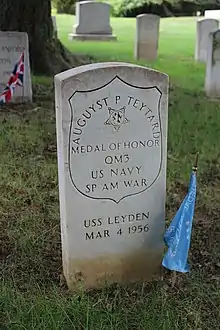August P. Teytand
August P. Teytand (April 6, 1878 – March 4, 1956) was a United States Navy sailor and a recipient of the United States military's highest decoration, the Medal of Honor for his actions aboard the USS Leyden.
August P. Teytand | |
|---|---|
| Born | April 6, 1878 Santa Cruz, West Indies |
| Died | March 4, 1956 (aged 77) Philadelphia, Pennsylvania, US |
| Place of burial | Mount Moriah Cemetery Philadelphia, Pennsylvania |
| Allegiance | United States |
| Service/ | United States Navy |
| Rank | Quartermaster Third Class |
| Unit | USS Olympia USS Leyden |
| Battles/wars | Spanish–American War *Battle of Manila Bay |
| Awards | Medal of Honor |
After immigrating to the United States from the West Indies and joined the Navy. He served aboard several ships including USS Olympia and USS Leyden. While serving aboard Olympia he traveled to Asia and participated in the Battle of Manila Bay during the Spanish–American War. He was a member of the crew of Leyden as well when it foundered in a heavy fog and sank. It was for his actions during the wreck of Leyden that he received the Medal of Honor. He died in 1956 and is buried in Mount Moriah Cemetery in Philadelphia, Pennsylvania.
Early life and military
Teytand was born April 6, 1878 in Santa Cruz, West Indies and after immigrating to the United States joined the Navy. He was an apprentice first class stationed aboard USS Olympia, a protected cruiser, when it departed Mare Island August 25, 1895 and joined the Asiatic Fleet. Olympia was designated as the flagship for the fleet upon its arrival and for the next three years Teytand cruised the Far East, visiting Japan, China, and the Philippines. On January 3, 1898 Commodore George Dewey took command of the fleet in anticipation of a pending war with Spain. The fleet waited in Hong Kong through the winter and on April 25, 1898 word was received that the United States declared war with Spain. With this news the fleet moved to Mirs Bay, China.[1][2]
On the morning of May 1, 1898 Commodore Dewey gave the order to enter Manila Bay and confront the Spanish flotilla commanded by Rear Admiral Patricio Montojo. At approximately 05:40, Dewey ordered Olympia's captain to open fire on the Spanish ships and the coastal batteries. Teytand and the other sailors aboard Olympia fired the first shots of the engagement and continued to engage the Spanish ships until the majority of Pasarón's flotilla of ships had been destroyed and then city of Manila surrendered to Dewey and the American forces. After the defeat of the Spanish forces and the surrender of Manila Olympia, Teytand, and the other members of the crew remained in the area and supported the United States Army by shelling Spanish forces on land.[1][2][3]
On May 20, 1899, after completing their mission in the Philippines, Olympia and her crew along with Teytand returned to the Chinese coast. They stayed in China for a month and then they returned to the United States, via the Suez Canal and the Mediterranean Sea. The ship arrived in Boston, Massachusetts on October 10, 1899.[2][3]

Teytand remained in the navy after the Spanish–American War and on January 21, 1903 he was serving as a quartermaster third class aboard the tugboat USS Leyden. When Leyden was returning from Puerto Rico it foundered near Block Island in a heavy fog and for his actions during the wreck he received the Medal of Honor December 26, 1903.[4][5] The full Medal of Honor citation reads:
For heroism while serving on board the U.S.S. Leyden at the time of the wreck of that vessel, 21 January 1903.[4]
In 1953 he posed for a picture for Life magazine with 64 other Medal of Honor recipients. The recipients were brought to New York City by Walter Winchell for a fundraiser for the widows and orphans of New York City firemen and policemen.[6]
He died on March 4, 1956 at the Naval Hospital in Philadelphia, Pennsylvania.[7] He is buried at Mount Moriah Cemetery in Philadelphia, Pennsylvania.[8]
References
- "USFS OLYMPIA Crew Roster". Spanish American War Centennial website. Archived from the original on 7 October 2010. Retrieved September 25, 2010.
- "Olympia". Dictionary of American Naval Fighting Ships. Naval Historical Command. Archived from the original on December 3, 2010. Retrieved September 25, 2010.
- Cooling, Benjamin Franklin (2007). USS Olympia: Herald of Empire. Annapolis, Maryland: Naval Institute Press. pp. 1–2. ISBN 978-1-59114-126-6. OCLC 183396685.
- "Medal of Honor recipients - Interim Awards, 1901-1911". Medal of Honor citations. United States Army Center of Military History. August 5, 2010. Archived from the original on 4 November 2010. Retrieved September 25, 2010.
- "Leyden". Dictionary of American Naval Fighting Ships. Naval Historical Command. August 5, 2010. Retrieved September 25, 2010.
- "65 Medal of Honor winners". Life: 57. April 6, 1953. Retrieved September 25, 2010.
- "AUGUST TEYTAND DIES; Navy Man Won the Medal of Honor for '03 Rescue Feat". The New York Times. March 9, 1956. p. 23. Retrieved September 25, 2010.
- Friends of Mount Moriah Cemetery
External links
- "August P. Teytand". Hall of Valor. Military Times. Retrieved September 25, 2010.